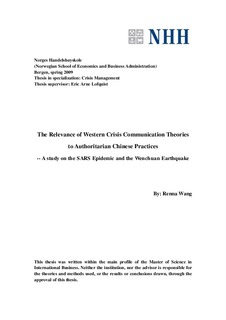| dc.contributor.author | Wang, Renna | |
| dc.date.accessioned | 2009-11-20T09:26:17Z | |
| dc.date.available | 2009-11-20T09:26:17Z | |
| dc.date.issued | 2009 | |
| dc.identifier.uri | http://hdl.handle.net/11250/168035 | |
| dc.description.abstract | The theoretical field of crisis management has just been established and developed since 1970s and in the past three decades, most of such theories were western-oriented and US-dominated. Inspired by Huang, Lin and Su (Taiwan) and Lee (Hong Kong)‘s explorations of cultural context in crisis communication, this thesis applied crisis communication theories to governmental practices in the mainland China examining the relevancy between theory and practice in a non-western context. The thesis specially focused on crisis communicative strategies corresponding to responsibility attributions, discourse of renewal optimistically promoting hopes and multi-voices influencing information exchange and responsiveness in crisis communication dominated by an authoritarian government. Then the thesis studied via chaos theory by comparing communication in two public crises (the SARS epidemic and the Wenchuan earthquake) over an extended period and suggested that crisis communication practices in China were bounded by the political system. | en |
| dc.language.iso | eng | en |
| dc.title | The relevance of western crisis communication theories to authoritarian Chinese practices : a study on the SARS epidemic and the Wenchuan earthquake | en |
| dc.type | Master thesis | en |
| dc.subject.nsi | VDP::Samfunnsvitenskap: 200::Økonomi: 210::Samfunnsøkonomi: 212 | en |
| dc.subject.nsi | VDP::Matematikk og Naturvitenskap: 400::Informasjons- og kommunikasjonsvitenskap: 420::Kommunikasjon og distribuerte systemer: 423 | en |
